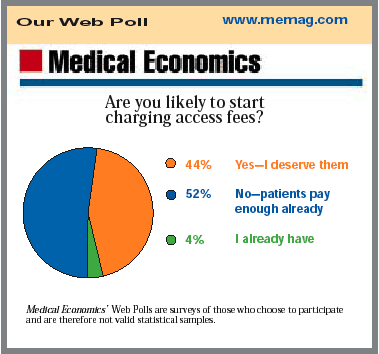Article
UPDATE: Focus on Practice
Author(s):
Malpractice caps; drug reimportation
Study: Maybe flat caps aren't the way to go
Federal and state lawmakers are increasingly looking at caps on damages as a solution to the growing malpractice crisis. Now two studies of California jury verdicts that were subjected to the state's $250,000 cap on noneconomic damages give them more to think about.
Researchers at both Harvard's School of Public Health and the RAND Institute for Civil Justice found that the reduction in total award was greatest for plaintiffs whose quality of life was most severely diminished. For example, according to the Harvard study, the reductions imposed on jury awards for a grave injury were seven times larger than those for a minor injury, with the largest proportional reductions centered on pain and disfigurement. In addition, RAND researchers suggest that because the California law combines award caps and a sliding scale for attorneys' fees, the difference between the defendants' savings and the reduction in plaintiffs' net recoveries may result more from reduced attorneys fees than from the cap on damages.
Missionary work from your easy chair
WorldFriendshipPlace, a new Internet-based medical charity, is looking for US doctors willing to lend their expertise to colleagues in underdeveloped nations. Requests for help usually come from practitioners who lack the level of expertise required to treat a specific condition or are working under adverse conditions. Through live and taped online communication, WFP volunteers provide the necessary medical training, technology, and case management.
To learn more about the program, go to www.worldfriendshipplace.org.
Canada moves against doctors who enable reimportation
While the tug of war over reimporting prescription drugs goes on between states and the FDA, Canada has begun sanctioning physicians who countersign US prescriptions without seeing the patient. Medical authorities found a general practitioner in British Columbia guilty of unprofessional conduct and failure to meet the standard of care for his role in enabling US residents to obtain Canadian drugs. In addition to receiving a reprimand, the doctor was fined $25,000 by The College of Physicians & Surgeons of British Columbia.
For practical advice on this subject, see "When patients want to buy meds online," in this issue.
Buy a medical device and get liability coverage too
In a first-of-its-kind program, a Canadian manufacturer of aesthetic medical devices for cosmetic procedures is offering any US physician who buys its products affordable malpractice coverage as well. Through Hub International, an insurance brokerage firm, Toronto-based Syneron says it enables physicians to buy flexible, comprehensive coverage for themselves and their staffs at a lower premium than they could obtain on their own.
Our Web Poll

Joan Rose. UPDATE: Focus on Practice. Medical Economics Sep. 3, 2004;81:6.





